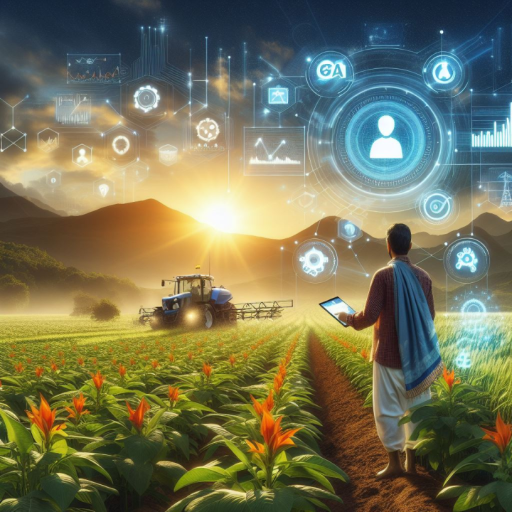India! one of the agriculturally inclined nations and a significant player in the sector. For 55% of India’s people, agriculture is their main source of income and the backbone of their nation. Farmers strive to produce better crops to feed the world’s 1.4 billion people, but they are unable to do it because of soil deterioration, water scarcity, and climate change.
Other present difficulties include their continued reliance on monsoon rains, their small landholding, scarce resources, and market inefficiencies brought on by restricted market access, which lowers the price at which their produce is sold.
India’s farmers are now using artificial intelligence to transform farming methods in order to solve these issues.
The AI Revolution in Indian Agriculture
Since AI made its first appearance in Indian agriculture, farmers are increasingly using it to reduce costs, improve crop quality, and promote simple, ideal farming practices.
AI-driven solutions are becoming more and more popular worldwide due to their benefits in supply chain efficiency, weather forecasting, agricultural monitoring, predictive analytics, and markets.
Here are a few applications of AI in the agricultural sector:
Precision Farming:
Weather forecasting and soil health monitoring are two applications of AI in precision farming.
Let’s start with soil monitoring. Artificial intelligence (AI) has sensors that can identify the pH, moisture content, and nutrient level of the soil. These sensors can tell farmers when their land needs to be fertilized and when it doesn’t.
The weather forecasting comes next, which includes making weather-related predictions to assist farmers in planning their fertilization strategies.
Pest and Disease Control:
AI detection systems use cameras and sensors that record information about movement, heat, and sound to automatically identify and monitor pests. By comparing these data points to large databases, machine learning algorithms allow artificial intelligence (AI) to recognize pests and suggest treatment strategies.
Smart Irrigation Systems:
In the field of smart irrigation, artificial intelligence (AI) is truly revolutionary since it is revolutionizing how we maintain lush landscapes and manage water supplies. Artificial intelligence (AI)-driven smart irrigation systems provide producers sustainable options to meet the growing demand for water conservation while yielding higher yields. Reportedly, the incorporation of AI in irrigation systems has contributed to a 25% reduction in water consumption. Furthermore, agricultural yields have increased by 20–30% thanks to precision farming’s use of AI technology.
Sensor-based irrigation uses sensors to gather information on temperature, moisture content in the soil, and other variables that may impact crop growth. AI algorithms then analyze this data to calculate the ideal irrigation water requirement.
Crop Selection and Yield Prediction:
Regression algorithms are commonly used for predicting crop yields because they are simple to understand and easy to implement.These algorithms anticipate the output (crop yield) by utilizing a set of inputs (weather, soil, and management practices, for example).
Artificial Intelligence (AI) can assist in the production of crops that are more weather- and disease-adapted by gathering data on plant growth. Scientists can use AI to find the best-performing plant kinds and crossbreed them to make even more superior hybrids.
Supply Chain Optimization:
AI improves the agricultural supply chain’s efficiency:
AI systems eliminate the need for middlemen by connecting farmers and buyers directly, guaranteeing higher prices for their produce. AI helps farmers plan their production and lower post-harvest losses by forecasting market demand for different crops.
Success Stories:
John Deere’s See & Spray: Businesses such as John Deere have created AI-powered agricultural equipment with sensors and GPS to sow seeds with accurate spacing and administer pesticides and fertilizers exactly where they are needed. This focused strategy boosts crop production while cutting expenses and waste.
Climate Corporation’s FieldView: Farmers can now make better decisions to optimize crop management because of early weather prediction thanks to AI forecasting tools.
Intello Labs: Intello Labs uses AI for quality assessment of agricultural produce, helping farmers and buyers ensure consistent quality and fair pricing.
AI’s Role in Agriculture Futures:
AI in agriculture appears to have a bright future ahead of it, with developments anticipated in fields like genetic engineering powered by AI, autonomous farming equipment, and real-time farm management systems. AI’s prowess in automation, predictive modeling, and data analysis will continue to propel profound changes in the agricultural sector.
It is critical to address issues like cost, data privacy, and the digital divide between large- and small-scale farming in order to fully realize the potential of AI. To ensure the responsible and inclusive deployment of AI in agriculture, cooperation between technology suppliers, farmers, researchers, and politicians will be essential.
Conclusion:
With applications like supply chain optimization, precision farming, crop and yield prediction, pest and disease control, and computation, artificial intelligence is currently transforming the agricultural industry. The purpose of all these AI applications is to help farmers overcome their prior difficulties. While obstacles underscore the necessity for ongoing development and moral behavior, success examples from organizations like The Climate Corporation and John Deere show how transformational AI may be. AI will play a more important role in agriculture as the field develops, presenting fresh chances for farming approaches that are inventive, sustainable, and efficient.

















